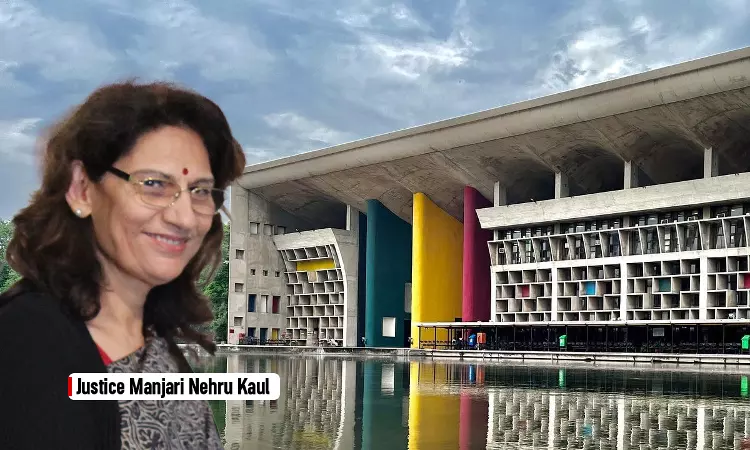- Home
- /
- High Courts
- /
- Punjab and Haryana High Court
- /
- PC Act | When Sanction Isn't...
PC Act | When Sanction Isn't Granted For Substantive Offence, Public Servant Can't Be Prosecuted Only For Conspiracy: Punjab & Haryana HC
Aiman J. Chishti
29 April 2025 8:11 PM IST
The Punjab & Haryana High Court has made it clear that if sanction to prosecute a public servant is not granted under Prevention of Corruption Act then he cannot be prosecuted for the offence of criminal conspiracy.Justice Manjari Nehru Kaul said, "view that a public servant, in respect of whom sanction to prosecute has not been granted under Section 19 of the PC Act, and who is,...
The Punjab & Haryana High Court has made it clear that if sanction to prosecute a public servant is not granted under Prevention of Corruption Act then he cannot be prosecuted for the offence of criminal conspiracy.
Justice Manjari Nehru Kaul said, "view that a public servant, in respect of whom sanction to prosecute has not been granted under Section 19 of the PC Act, and who is, therefore, not charged with any substantive offence under the said Act, cannot be proceeded against solely under Section 120-B of the IPC, when the alleged object of the conspiracy is the commission of offences under the PC Act."
The Court highlighted that the charge of conspiracy under Section 120-B of the IPC, in such circumstances, is legally unsustainable, as it amounts to an indirect prosecution for an offence which is otherwise barred by statute.
The plea was filed by one Sachin Ahlawat seeking quashing of order of cognizance as well as summoning order passed by the CBI Court in FIR registered under Section 7 of the Prevention of Corruption Act (PC Act) and Section 120-B IPC.
Senior counsel appearing for the petitioner Bipan Ghai argued that the trial Court has erred in taking cognizance of the case without prior sanction under Section 19 of PC Act, which is a mandatory precondition for prosecuting a public servant for offences under the said Act.
Cognizance has been taken against the petitioner solely under Section 120-B of the IPC, in the absence of any substantive offence under the Indian Penal Code being attributed to him. It was asserted that this amounts to a circumvention of the statutory bar imposed by Section 19 of the PC Act, he added.
After hearing the submissions, the Court noted that despite the statutory embargo under Section 19 of the PC Act, the CBI now seeks to prosecute the petitioner solely for criminal conspiracy under Section 120-B IPC.
The CBI admitted that the alleged conspiracy pertains exclusively to the purported demand for illegal gratification—an offence that squarely falls within the ambit of Section 7 of the PC Act. In essence, the object of the alleged conspiracy is an offence for which prosecution stands barred due to the express denial of sanction.
Justice Kaul noted that it is a settled principle of law that while conspiracy constitutes an independent offence under the IPC, it cannot be assessed in isolation from its object. The viability of a conspiracy charge is inextricably tied to the lawfulness of the act sought to be achieved.
In the present case, the foundation of the alleged conspiracy rests entirely on an offence under the PC Act. The judge pointed that the sanction expressly refused by the competent authority, to which no challenge has been made by the prosecuting agency, any attempt to prosecute the petitioner for conspiracy alone—when the object of that conspiracy is itself legally non-prosecutable—amounts to a colourable exercise of power.
"It constitutes a clear attempt to achieve indirectly what the law prohibits directly, thereby undermining the statutory mandate and rendering the protection under Section 19 illusory," said the Court.
It found that in the present case, no other offence under the IPC has been alleged against the petitioner apart from Section 120-B of the IPC. Further, the prosecution has conceded that the alleged conspiracy pertains solely to the offence under Section 7 of the PC Act. "There is no material on record to suggest any independent criminal act or conspiratorial objective that is unconnected to the PC Act," said the Court.
Reliance was placed upon Pavana Dibbur Vs. Directorate of Enforcement, to underscore that a charge of criminal conspiracy under 120-B IPC cannot be sustained in isolation and must relate to a substantive scheduled offence.
The Court added that though the case arose in the context of the Prevention of Money Laundering Act (PMLA), the underlying principle applies equally to the Prevention of Corruption Act.
In the light of the above, the Court concluded that what cannot be done directly cannot be done indirectly. Allowing the prosecution of a public servant under Section 120-B IPC for conspiracy to commit an offence under the PC Act, despite the denial of sanction, would effectively render the provision of Section 19 of the PC Act nugatory.
Stating that "The safeguard of sanction would thus become illusory, and the constitutional protection under Article 14 would be compromised, allowing for the selective and unjust application of penal consequences", the Court allowed the plea.
The Court also clearified that negating the provision of sanction "would undermine the clear legislative intent, eroding the protective framework designed to shield public servants from unwarranted prosecution."
Mr. Bipan Ghai, Sr. Advocate with Mr. Nikhil Ghai, Advocate and Ms. Pragyat Bhardwaj, Advocate for the petitioner.
Mr. Ravi Kamal Gupta, Advocate for the respondent-CBI.
Title: Sachin Ahlawat v. Central Bureau of Investigation
Click here to read/download the order



